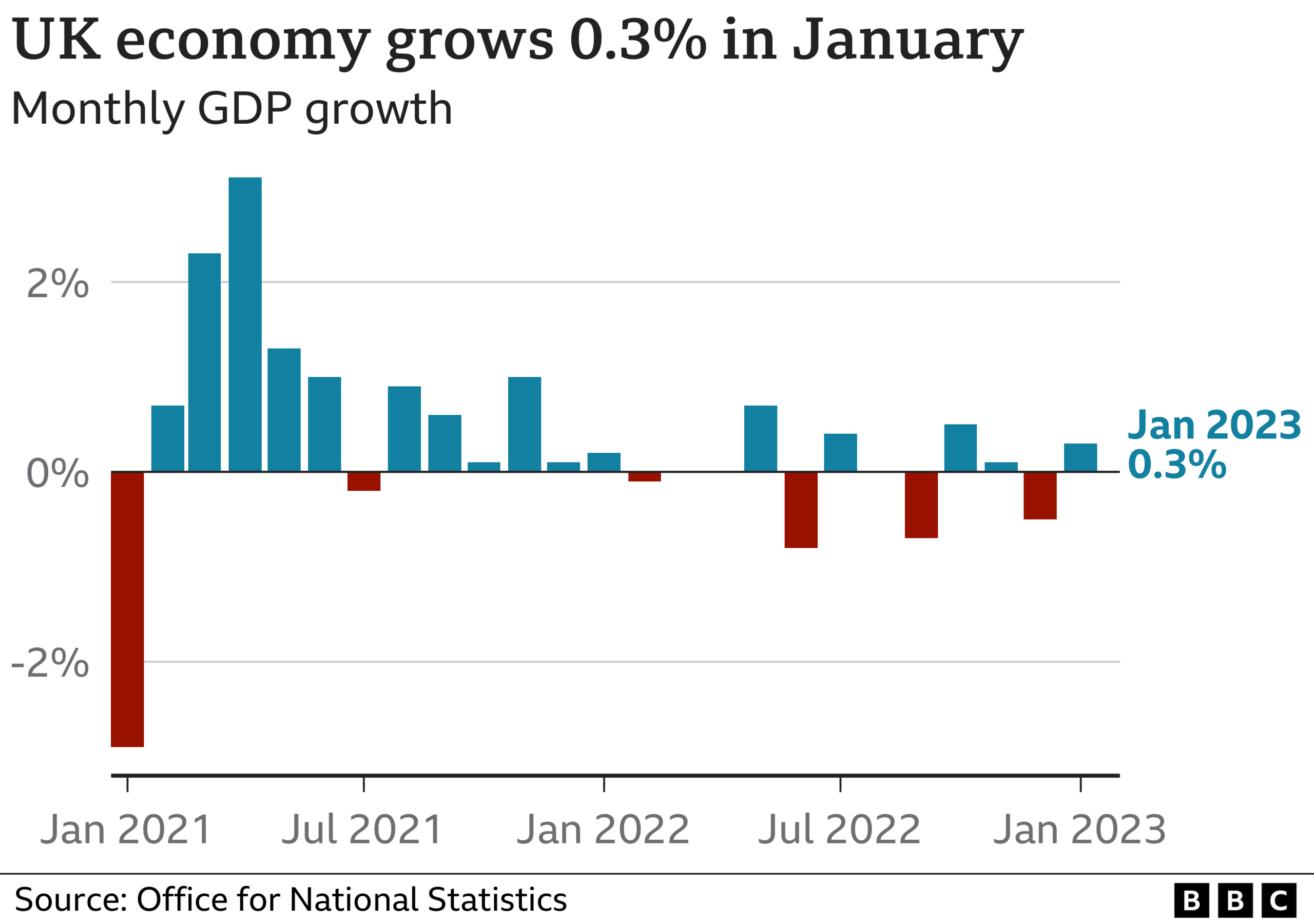UK economy rebounds as Rishi Sunak says confidence is returning
- Published

The prime minister has said "confidence is returning" after official figures showed the economy grew by more than expected in January.
Rishi Sunak said the data confirmed the government's plan is "the right one and we need to stick to it".
The economy expanded by 0.3% in January, rebounding from a sharp fall in December.
Higher school attendance and the return of Premier League football after the World Cup helped boost the figure.
The data comes ahead of the Budget next Wednesday when Chancellor Jeremy Hunt will set out the government's growth plans.
January's growth followed a 0.5% contraction in the economy during December. However, the ONS figures also showed that the economy stagnated in the November to January period compared with the previous three months.
Mr Sunak added that the data showed the economy is "better than people had feared".
But Rachel Reeves, Labour's shadow chancellor, said: "Today's results show our economy is still inching along this Tory path of managed decline."
Darren Morgan from the Office for National Statistics (ONS), which collects and publishes the data, said the main factors behind January's growth were "the return of children to classrooms, following unusually high absences in the run-up to Christmas, the Premier League clubs returned to a full schedule after the end of the World Cup and private health providers also had a strong month".
"Postal services also partially recovered from the effects of December's strikes."
In education, school absences rose in December due to a spike in winter flu, Covid-19 as well as rising rates of Strep A, which can lead to scarlet fever.
The return of more children to school helps to boost the economy as it is deemed to increase the output of the education sector. The ONS said the education sector grew by 2.5% in January following a fall of 2.6% the month before.
Activity in arts, entertainment and recreation also grew, mainly due to the return of Premier League football.


These numbers are better than expected but the economy still has not grown over three months - and that is what is expected again between January and March.
Consumers have proven more resilient so far to the rise in energy prices and interest rates.
The Budget forecasts next week will be from a better baseline than feared last time, thanks to energy prices starting to fall.
While avoiding a formal recession entirely is now possible, for now the overall trend in the economy is flat, with tax rises and the full effect of higher interest rates to come.

However, the figures for January showed a fall in output in both the manufacturing and construction sectors.
"Looking beneath the surface, the figures suggest the economy is on weaker ground than it appears," said Ruth Gregory, deputy chief UK economist at Capital Economics.
She added that strike action in February may have hit growth and the impact of successive interest rate rises is yet to be felt by parts of the economy.
Last month, ambulance workers, teachers, nurses and some in the rail industry walked out.
"So we doubt January's strength will last and our hunch is that there will still be a recession," said Ms Gregory.

However, other economists were more upbeat including Goldman Sachs, the investment bank, which predicted that the UK will avoid a downturn.
A recession is usually defined as two three-month periods in a row when the economy shrinks.
The UK reported flat growth between October and December and Goldman now expects flat growth to continue in the first three months of this year.
The UK continues to grapple with a high rate of price rises, or inflation, leading to a squeeze on the cost of living.
While it has fallen back slightly in recent months as wholesale gas prices have ticked lower, inflation remains at its highest level for nearly four decades.
The Bank of England has raised interest rates to 4% - the highest since 2008 - in an attempt to quell inflation. While that benefits some savers, it has also raised pressures on many mortgage holders.
Related topics
- Published2 February 2023

